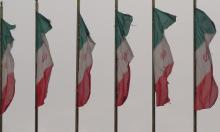Palestinian gunmen kill three Israelis, wound five in two West Bank attacks
Palestinian gunmen in a speeding car opened fire at a crowded bus stop in a West Bank intersection on Sunday, killing three Israelis and wounding four others in the deadliest attack on Israelis in more than three months, Israeli officials said.
Minutes later, militants carried out a second drive-by shooting, targeting an Israeli vehicle in the West Bank and seriously wounding one Israeli, officials said.
The shooting was the bloodiest attack since Israel completed its pullout from the Gaza Strip and four settlements in the northern West Bank last month. Israeli security officials have warned that following the Gaza withdrawal, Palestinian militants would shift their focus to the West Bank.
The Al Aqsa Martyrs' Brigades, a militant group loosely affiliated with the ruling Fatah party, claimed responsibility for the shooting attacks.
Israel responded with tough new measures limiting movement in the West Bank, security officials said. Exit from Bethlehem and Hebron will be blocked, Palestinian cars will be banned from the area and arrests raids will be stepped up, the officials said on condition of anonymity because they are not authorized to speak to reporters. The decisions were made at high-level consultations led by Defense Minister Shaul Mofaz.
The first attack took place at the Gush Etzion junction, a main intersection in a bloc of settlements south of Jerusalem. Militants racing by in a car opened fire at Israelis waiting at a bus stop and at others in nearby cars.
Israeli rescue services said one Israeli died at the scene and two others died in the hospital. Paramedics said two of the wounded were in serious condition. One of the wounded was a soldier, the military said.
The ground at the shooting site was covered in blood, and large numbers of police and soldiers searched the area. One soldier straightened up the bags, cameras and other belongings of the victims.
The second attack took place near the settlement of Eli in the northern area of the West Bank, relatively far from the first shooting. Rescue services said one Israeli was seriously wounded.
Violence between Israel and the Palestinians drastically decreased in recent months after the two sides agreed to an informal truce in February, though attacks have continued.
The shooting Sunday was the deadliest attack on Israelis since a July 12 suicide bombing in the northern Israeli town of Netanya killed five Israelis.
In an effort to strike a blow at Palestinian militant groups, Israeli troops conducted massive arrest raids across the West Bank in recent weeks, detaining hundreds of wanted Palestinians.
Also Sunday, Israeli troops killed a top Islamic Jihad militant in the northern West Bank.
Palestinian hospital officials said Nihad Abu Ghanim, 27, died after being shot in the head, abdomen and chest. A bystander was wounded and was in serious condition. Abu Ghanim was the top Islamic Jihad militant in Burkin, a village outside the northern West Bank town of Jenin.
The army said Abu Ghanim was killed when Israeli troops on a routine patrol in the area spotted an armed Palestinian. The man shot at them and they returned fire, killing him, the army said.
A witness said two Israeli jeeps drove up to Abu Ghanim as he was driving down the road and shot him inside his car.
Israel has demanded the Palestinians dismantle militant groups if it wants to restart peace talks. "The Palestinian Authority has to move from the talking stage to the action stage," Mofaz said. "We will not be able to continue in this process if the Palestinian Authority does not start taking concrete actions against the terror groups."
Palestinian leader Mahmoud Abbas has ruled out such a crackdown, saying it would start a civil war. His policy of using negotiation and persuasion, rather than force, to stop militant attacks has achieved only mixed results.
The Palestinian Interior Ministry said Sunday that its forces had stopped Gaza militants from launching attacks against Israel 17 times since Israel's withdrawal.
The attacks were mainly attempts by militants to fire rockets into Israel, according to Tawfik Abu Khoussa, the Interior Ministry spokesman. Palestinian forces also closed two smuggling tunnels under the border with Egypt and prevented seven smuggling attempts, he said. Israel fears that weapons and militants could be brought into Gaza through the tunnels.
After its pullout, Israel said it would react harshly to any attacks originating from Gaza and launched a widespread offensive, including airstrikes, when Gaza militants fired a barrage of homemade rockets into Israel at the end of September, AP reported. V.A.
Subscribe to Pravda.Ru Telegram channel, Facebook, RSS!




